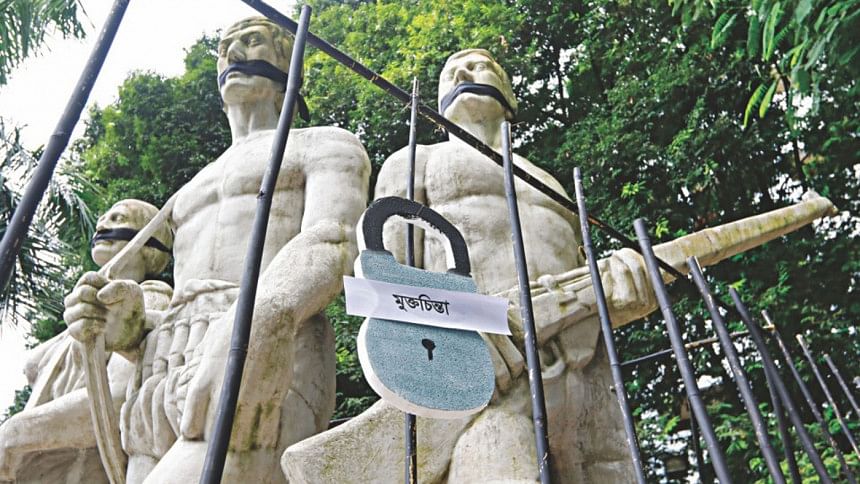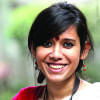Decrees cannot drown debates

October 7, 2020 marked the first death anniversary of second-year Buet student, Fahad Abrar, who was tortured to death by members of Bangladesh Chhatra League (BCL) for posting a criticism of an agreement signed between Bangladesh and India on the use of the Mongla port, water sharing and export of energy sources. The autopsy report said he died of "internal bleeding and excessive pain" after being beaten for at least four hours by cricket stumps, sticks and skipping rope in his dormitory.
On the same day, the Department of Secondary and Higher Education (DSHE) issued a circular forbidding students and teachers from writing, sharing or even "liking" anything that "ruins the image of the government or the state", or "disrespects any important person, institution or profession" on social media. It further cautioned against posting any writing, audio or video that could create "dissatisfaction among the general public".
It is no doubt a coincidence that the government chose that precise date to warn students and teachers of the repercussions of voicing dissent on social media platforms. But perhaps it was only fitting. When you foster a system where anyone who does not subscribe to your worldview is criminalised by laws and every possible state machinery—and by extension, those who do, are rewarded with a range of political and economic benefits—you not only create the conditions for such barbaric violence as Abrar's murder, but also make it inevitable. By linking the two incidents, however subconsciously, the government has made it that much easier for us to see that censorship exists on a continuum of violence.
On October 10, Anik Sarker, the expelled information and research secretary of Buet BCL, and one of the 25 accused in the Abrar murder case, confessed to the horrific torture before the court. "They [BCL] made us so cruel. I wasn't like this when I came to Buet from Notre Dame College," he claimed in his statement. Another accused, Meftahul Islam Zion, said, "The system made us that cruel. If we could force out anyone of different opinions from Buet campus, the BCL high command would praise us." While I feel little sympathy for these young men who turned into monsters in their relentless quest to establish authority over the student body, their claims—that they, too, are victims of a ruthless system that glorifies blind loyalty and pursuit of power and discourages any forms of critical thinking and rational debates—cannot be rejected outright.
"When you foster a system where anyone who does not subscribe to your worldview is criminalised by laws and every possible state machinery—and by extension, those who do, are rewarded with a range of political and economic benefits—you not only create the conditions for such barbaric violence as Abrar's murder, but also make it inevitable."
"When you foster a system where anyone who does not subscribe to your worldview is criminalised by laws and every possible state machinery—and by extension, those who do, are rewarded with a range of political and economic benefits—you not only create the conditions for such barbaric violence as Abrar's murder, but also make it inevitable."
And the BCL is only part of the problem, or rather, only a manifestation of a much larger crisis. Our education system itself is held hostage by corrupt and inefficient administrations, who act less like educators and more like lackeys to the ruling party and are unfortunately rewarded for it. Very few public universities, if any, can claim to have retained any institutional commitment to truth, intellectual rigour, integrity, rational debates or critical thinking, having become hotbeds for corruption, nepotism, tender-baji, rape culture and all forms of violence. When called out by students and a handful of teachers who refuse to compromise or succumb to party politics for massive irregularities in the system, these administrators have chosen increasingly despicable means to silence criticism, from serving show-cause notices to students for as little as sharing newspaper articles to allowing armed goons to swoop down upon peaceful protestors to facilitating arrests under the country's draconian digital security act. Despite widespread protests and irrefutable evidence of the authorities' complicity in corruption and other malpractices across campuses in the country, the government has consistently taken the side of the administrators over that of the students. And now it has given the ammunition needed by university administrators, aided and abetted by their trusted allies, BCL cadres, to target, harass and criminalise anyone they deem to be a troublemaker.
Unfortunately, legitimate demands from students for change and greater accountability both within the education system and larger society has been met with suspicion and animosity from the government's side. In the absence of a credible opposition either in the parliament or on the streets, the government seems bent on making an enemy out of anyone exercising their right to engage in civic and political processes by terming them as "anti-state" and criminalising them through arbitrary use of existing laws. We observed with trepidation how, during the road safety movement, young students' peaceful demands for safer roads turned into an unnecessarily violent witch hunt. Similarly, activists of the quota reform movement were harassed, attacked and threatened by state and non-state actors, while many of the movement's leaders were arrested and even put on remand. And now, as anti-rape protests rage on the streets, the government seems to want to read them through their usual lens of distrust and paranoia—what else explains why this decree would be issued at the height of the protests?
Students and teachers are being criminalised at greater frequency for expressing their opinions on social media, and the criterion of what counts as "disrespectful" to the state and important persons is being pushed further and further to the right with each passing day and each passing decree. Earlier in the year, on June 18, two teachers from Rajshahi university and Begum Rokeya University in Rangpur were picked up in the middle of the night for making "derogatory remarks" against former health minister Mohammad Nasim on social media. On June 20, a ninth grader was arrested for allegedly "defaming" the prime minister and placed in a child detention centre at the height of the coronavirus pandemic. On July 20, two teachers from Farakkabad College campus were arrested for their "derogatory Facebook posts against education minister, upazila nirbahi officer and others". In all these cases, arrests took place within 24-48 hours of the social media post, and the plaintiffs were people affiliated with the ruling party in some capacity or another. In fact, an overview of cases filed under the DSA over the last two years suggest the same trend for an overwhelming majority of the cases. Filing a case under the DSA is apparently now used as proof of a member's or enthusiast's loyalty to party leaders or party ideologies, and circulation of increasingly repressive decrees that seeks to criminalise even sharing or "liking" news reports, much less opinions and commentaries that are open to interpretation, will only fuel such eagerness.
Despite the dangerous implications of the decree from DSHE, it did not create much of a ripple in social media or in the opinion pages of major newspapers. It is possible that at this point we have lost count of the number of times we have been told to keep our mouths shut and our social media platforms free of anything but party propaganda and apolitical cat memes. Shortly after this decree was passed, the government issued another statement forbidding people from spreading "false, fabricated, confusing, and inciting statements" on social media about government, military, police officials and members of other law enforcement agencies. These statements, issued in such close proximity to one another, signal a far more dangerous turn in the near future for a nation that has long bid farewell to constitutional guarantees of freedom of thought and conscience.
What the government is forgetting in its zeal to censor free thought is that, in the process, it is creating an enemy out of ordinary citizens, particularly young people, who simply want a fairer and just Bangladesh. It is also making a mockery of the education system itself, which is supposed to teach students to interrogate the world they live in so that they can come up with more nuanced explanations of the past, and better solutions for the present and the future. What sort of future leaders can we hope for when we systematically criminalise critical thought and engagement in civic and political processes in constructive and non-violent means, but reward violent exercise of power, rapacity, and corruption?
The only hope lies in what our own history teaches us: that decrees cannot silence debates, restrictions cannot muzzle rational thought and revolutionary fervour, and the youth cannot be threatened into submission. At least, not for long.
Sushmita S Preetha is a journalist and researcher.

 For all latest news, follow The Daily Star's Google News channel.
For all latest news, follow The Daily Star's Google News channel. 



Comments